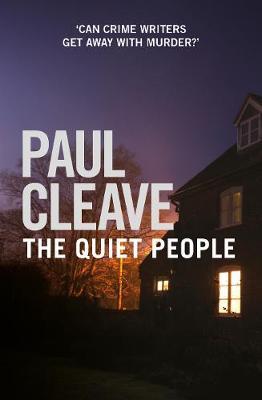"We kill people for a living..." "If anybody can get away with murder, it's a crime writer." (p.138)
In his latest book, local crime writer Paul Cleave, three-times winner of the Ngaio Marsh Award for Best Crime Novel, comes home to Christchurch to question the culpability of mystery writers for their ideas.
A crime-writing duo, married couple Cameron and Lisa Murdoch come under the spotlight when their son Zach goes missing. Viewed initially as a runaway case, the evidence soon points disturbingly to abduction.
My first instinct was to sympathise with the parents of the missing child. Unfortunately this is not borne out by crime statistics. I didn't realise police view parents as the first primary suspects in a child abduction case. Yet when an adult goes missing, everyone looks to the partner.
Despite the reveal at the beginning of this gripping story, Cleave throws in questionable behaviours to muddy the waters: making the reader doubt the innocence of Cam and Lisa Murdoch and to suspect foul play. Things they have said in previous interviews, Cam's reaction to Zach throwing a public tantrum, a disastrous appeal on public television and even enemies combine to point the finger at them:
"I have no doubt we could plot the perfect crime if we had to. It's what crime writers do every day. It's all about selling the misdirection." (p.138)
"...right now we're looking like parents who might have reached their breaking point." (p.44)
Paul paints a picture of a loose canon in Cam, a man capable of hurting others to protect his own. Even his wife isn't sure. The public reaction is nasty:
"I don't know how Cameron Murdoch did it, but he did it. We all know he did it. You ever read his books? A man like that, a man who can write such twisted things like he writes, well, he has to be wrong in the head, doesn't he? ...if anyone can get away with a crime like that, its a crime writer." (p.238)
A parent who has lost hope has nothing to lose: putting on the shoes of a character in his books, Cam takes things too far in his search for answers, not trusting in the police. In a moment of self-awareness, Cleave observes that it may not be that easy for Cam to take matters into his own hands. However his righteous anger at injustice is contagious.
 Paul Cleave is a clever writer. The plot fishtails through this story. The Quiet People begins with what looks like an ending, then appears to end in the middle - except it can't possibly! He plants a vital clue, then buries it deep, until it begins to flash in the reader's mind like a neon sign.
Paul Cleave is a clever writer. The plot fishtails through this story. The Quiet People begins with what looks like an ending, then appears to end in the middle - except it can't possibly! He plants a vital clue, then buries it deep, until it begins to flash in the reader's mind like a neon sign.
He also kept me guessing by using alternating narrators - Detective Rebecca Kent and Cameron Murdoch. Which is the reliable one? You decide.
Who are the quiet people? Paul's protagonist voices his choice of title :
"Soon they will interview neighbours. They will call us The Quiet People. It's a name we coined from where neighbours are talking to reporters, saying, "We can't believe he killed his boss. He was always so quiet, keeping himself to himself." Or, "We can't believe she drowned her children. She was always so quiet, we hardly ever saw her." (p.52)
"There are stories from outside Lucas Pittman's house. A normal-looking house in a normal-looking street, neighbours saying he was always quiet, even if he were creepy." (p.197)
Is New Zealand a nation of 'trial by neighbour' ? Our communities and cities are small, so when a tragedy happens, its often personal.
There are famous cases in our history where the accused is not proven guilty beyond reasonable doubt, yet the general public view is still 'guilty'. Just mention Mark Lundy, David Bain or Ewen Macdonald. There have been occasions in New Zealand where houses involved in a murder scene or abduction have been torched by outraged members of the community.
While Cleave paints a grim picture of Christchurch's alter ego, 'Crimechurch', but we have to remind ourselves that this is fiction. Christchurch is a city of compassionate people, proven by our response to the tragedy of 15 March. The lighter side of our nation is also revealed to the reading public: NZ is a country of 'barbeque for breakfast' at Christmas, while Bilbo Baggins features on the suspect line-up at the cop shop.
As trial by neighbour and trial by media are the pivotal focus this book, it's apt that Paul dedicates this one to his:
"To my neighbours -
Who, I learned, for years have heard me singing in the shower. I am truly sorry."
At the moment I'm living and breathing crime novels as we celebrate Dame Ngaio Marsh's birthday (23 April). I hope it doesn't rub off on me.



Add a comment to: Always the Quiet Ones – Paul Cleave’s The Quiet People